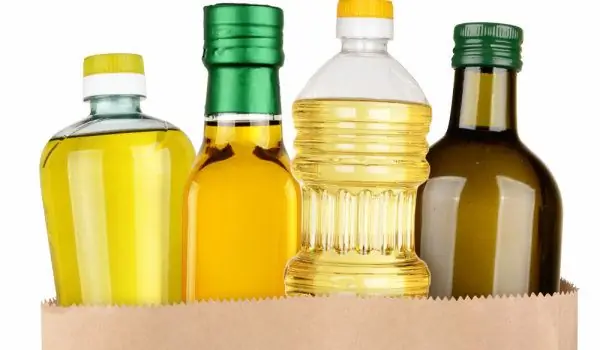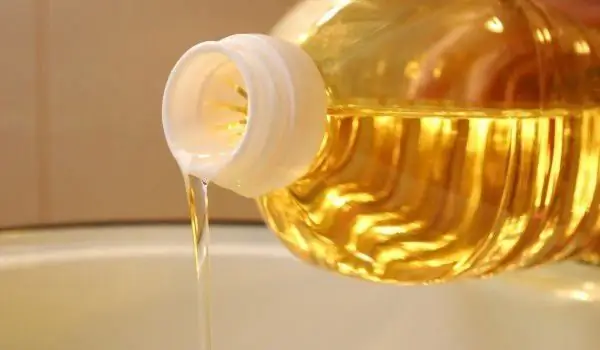2025 Author: Jasmine Walkman | [email protected]. Last modified: 2025-01-23 10:18
Many people deny it sunflower oil, but it is the most famous and widespread fat in our homes. We use it for frying soft cakes, for example, for making pans and what not. We put it when kneading homemade pies with cheese, pasta, tutmanitsa and what not.
But do we know? what sunflower oil contains, how it is made, what are its benefits and harms. We will now try to answer these questions.
The oil is all around. Some people think it is harmful and "scary" and replace it with olive oil, but this is not true. If in your diet oil is the only fat from which you get essential fatty acids, then the oil is not harmful at all, on the contrary. In Bulgaria, oil is the most famous source of fat, after butter, of course. As we know, sunflower oil is extracted from sunflower seeds. In the world, sunflower is one of the most famous oilseeds, followed by soybeans and canola.
One of the largest oil producers are China, Russia, Argentina, France, Ukraine, Australia. The fact is that Bulgaria is one of the most important countries in Europe, which has many varieties of sunflower. The history of oilseed sunflower begins in North America. From there, the sunflower was brought to Europe as a kind of ornamental plant in the Botanical Garden in Madrid in the distant 1510. Russia first used it to extract oil in the 19th century. In Bulgaria, sunflower falls after the Liberation.
Benefits of sunflower oil
100% fat contains:
- From 48 to 74% linoleic fatty acid, which is the main omega-6;
- From 14 to 17% oleic acid, which is the main omega-9;
- From 4 to 9% palmatic fatty acid;
- From 1 to 7% stearic fatty acid.

You can see for yourself oil is a source of omega-6 and omega-9 fatty acids. In order to have a balance in the intake of essential fatty acids, it is very important to monitor the amount of them in the bottle of oil we bought. Sunflower oil contains a large amount of lecithin and vitamin E. Lecithin helps cells to function better because it provides material for cell membranes, and vitamin E in turn acts as an antioxidant and also supports the immune and cardiovascular systems.
Sunflower seed products:
1. Natural, unrefined, cold pressed sunflower oil "To extract this one." kind of oil pressed seeds are used together with their husks. This type of oil contains a lot of vitamin E, omega-6 and omega-9 fatty acids. It does not contain toxic acids from chemical treatments, because in the process of its production such are not used. This kind oil is used most often in the cold kitchen - for various salads, vegetable pockets, or added to foods that have already undergone heat treatment, but after they have cooled;
2. Refined oil / single, double refined, etc./- This oil is made by chemically extracting from dried or roasted seeds. This type of oil has been refined several times, as a result of which no proteins are left in it. The quality of this type of oil is known by the fact how much residual acid is in it after it is filtered. The fewer they are, the less harmful it is and the higher its price. The fact that we fry and bake with refined oil does not make it harmful. It is harmful to the heat treatment to which it is subjected, because then the essential fatty acids are saturated and oxidized.
3. Vegetable margarine, hydrogenated oils - Recently in Bulgaria the so-called "cholesterol-free margarines" / hydrogenated oils / have become very famous, which are not supposed to be filled because they contain only 30 to 70% fat. But their composition is according to.
Nutritional composition of sunflower oil:
100 grams of product contain:

Water - 0%;
884 kcal;
Protein - 0 grams;
Fat - 100.00 grams;
Carbohydrates - 0 grams;
Phytosterols - 100 mg;
Sugar - 0 grams;
Fiber - 0 grams.
Benefits of sunflower oil:
1. The oil has an antimicrobial effect - It is believed that if the oil is applied to the skin, it can significantly reduce the risk of infections;
2. The oil affects the balance of essential fatty acids in our body by supplying it with omega-6 and omega-9 essential fatty acids;
3. If you consume it, you get phospholipids;
4. Enriches the food prepared with it with vitamin E.
Harm from the oil
1. If consumed in large quantities or as a major source of fat, it impairs the omega 3-omega and omega-6 balance of essential fatty acids, which can damage the immune system;
2. If refined oil is used, subjected to heat treatment, this increases the risk of tumors and other malignancies, because it contains chemical contaminants, because as I said during heat treatment linoleic and oleic acids are oxidized;
3. Margarine significantly "helps" the accumulation of trans fats in our body, which leads to very bad consequences, especially increasing the risk of disease such as atherosclerosis;
4. If you take rancid oil, then you can be poisoned with aflatoxins;

Selection and storage of oil
- When looking for sunflower oil in the store, make sure it is cold pressed with a label that shows the origin and composition of omega-3 and omega-6 essential fatty acids per 100 ml of product;
- If you want to buy margarine, look on the label to see if there is a guarantee that it does not contain trans fats.
- Cold pressed and hydrogenated sunflower products must be stored in the refrigerator;
- Refined oil is stored in a dry and cool place.
How can we use sunflower oil?
The best way to use sunflower oil is to flavor fresh salads and dishes with it, especially in the cold kitchen. Add it to dishes that have already undergone heat treatment, but only after they have cooled down.
Recommended:
How To Store Olive Oil And Vegetable Oil

The oil is stored quite a long time thanks to its factory packaging. It is sold with a tightly closed lid and thanks to this it can retain its qualities for two years. Oil bottles should be stored in a cool dark place. It is better to store oil that is sealed in glass rather than plastic bottles.
Okra Oil Replaces Coconut Oil

Okra (Abelmoschus esculentus, Hibiscus esculentus) is an annual herbaceous plant, reaching a height of nearly one meter. The use of okra is broad-spectrum. The fruits can be eaten fresh or dried and added to various dishes, soups or sauces.
Olive Oil Versus Rapeseed Oil: Which Is Healthier?

Rapeseed oil and olive oil are two of the most popular cooking oils in the world. Both are touted as heart healthy. However, some people wonder what the difference is and what is healthier. What is rapeseed and olive oil? Rapeseed oil is produced from rapeseed (Brassica napus L.
Cooking With Sunflower Oil Can Cause Cancer

If you often cook with sunflower oil, you increase the risk of suffering from cancer in the future due to the release of toxins, say scientists from the universities of Oxford and Leicester. Although unsaturated fats are good for the human body, scientists warn that in vegetable oils such as sunflower oil, corn and rapeseed oil, they can be extremely dangerous to your health.
Do Not Overdo It With Sunflower Oil

Sun-view. Do you remember where the name of the bright yellow plant comes from? It looks like the sun, and from dawn to dusk it stares at it. Sunflower came to our latitudes from America. It is because of the eternal gaze in the sky that the Indians associate it with the cult of the sun.

